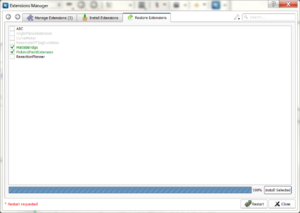Difference between revisions of "Documentation/Labs/AutomaticUpdateAndInstallationFramework"
From Slicer Wiki
Mneugebauer (talk | contribs) |
Mneugebauer (talk | contribs) (added a link to a patch file) |
||
| Line 79: | Line 79: | ||
== Patch == | == Patch == | ||
| + | * [[File:0001-ENH-working-version-of-extension-restore-functionali.zip|thumb|First patch]] | ||
== Questions == | == Questions == | ||
Revision as of 11:31, 7 December 2016
Home < Documentation < Labs < AutomaticUpdateAndInstallationFrameworkContents
Overview
This page serves as roadmap for the Slicer Automatic Update and Installation framework.
Use cases:
- New Slicer version installed locally should be updated with the list of extensions previously installed.
- Self update of Slicer
Terminology
- User Interface
- Extensions Manager is a Slicer dialog allowing the user to Search, Install, Remove and disable extensions.
- ExtensionWizard module: This is a Slicer module providing a graphical interface within Slicer to aid in the creation of Slicer extensions.
- Command line
- ExtensionWizard is a command line tool to simplify the process of creating and contributing extensions.
- API
- ExtensionsManagerModel: This is the backend of the Extensions Manager displayed to the user
- Utilities/Scripts/SlicerWizard: This is a python package used in the ExtensionWizard
Convention
Tasks listed in this page can be associated with any of these state:
Use case: Keep track of the installed extensions across version
The goal here is to simplify the number of steps allowing people to reinstall extensions that were used in a previous installation.
- Update: Mathias is currently working on this task (Previous Efforts by Dennis)
- Meta issue: 2779: Mechanism to keep track of the installed extensions across version
Idea
- After installing a new version of Slicer, the user can select from all previously installed extensions and batch-install them
- extensions installed in the last (previous) Slicer versions are marked and preselected (one click-solution for getting the previous setup)
- extensions that where previously installed but are not compatible for some reason, are shown but not selectable
- UI: a third tab ("Restore Extensions") should be added to the Extension Manager and provide at least a list view for selection / a button button for installing the selected extensions
Gathering information about previous extensions
- extensions information / subfolders containing the extensions are available in the "NA-MIC" folder
- on Linux, that's in ~/.config/NA-MIC
- on Windows, in AppData/Roaming
- on OS X, seems to be a subdirectory of the application bundle
- folder contains and Slicer-[Revision].ini file that points to paths relevant for extensions (modules/libraries/dependencies)
- however, no explicit information about installed extensions are stored there, information about installed extension is gathered at runtime by parsing the extension subfolders
- PROPOSAL: added the extension IDs of all currently installed extensions in an additional setting information
[Extensions]/InstalledExtension, thus, no folders need to be parsed and only the .ini files are needed
Changes
Base/QTGUI/Resources/UI/qSlicerExtensionsManagerWidget.ui- a new tab ("Restore Extensions") was added
- this tab contains a placeholder-widget for the
qSlicerExtensionsRestoreWidget
qSlicerExtensionsManagerModel- add a function that provides informations about previous extensions:
getExtensionRestoreInformation() - add a callback for tracking the progress during non-update related updates:
onInstallDownloadProgress(used in:downloadAndInstallExtension) - extend
installExtension/scheduleExtensionForUninstallto add (remove) ids of installed extensions to a new parameter[Extensions]/InstalledExtension
- add a function that provides informations about previous extensions:
Addition
qSlicerExtensionsRestoreWidget- a new widget that renders a list of available extension that were previously installed
- on initialization it calls
getExtensionRestoreInformation()and builds a ListItemWidget - if "Install selected" is triggered,
downloadAndInstallExtensionis called sequentially for each selected extension - after installation of all extensions, the list is updated
Progress
- Adapt extensions manager model to provide neccessary information
 Completed
Completed - Extend the UI of the extensions manager (new tab, new widget)
 Completed
Completed - Add a widget that provides a selectable list of previously installed extensions
 Completed
Completed - Install procedure (with feedback) for selected extensions
 Completed
Completed - Discuss the proposed solution with JC ToBeDone
- Adapt solution accordingly ToBeDone
- Submit solution ToBeDone
Patch
Questions
- Does the uninstall progress also remove the extension-subfolders?
- Is the proposed solution (accessing the .ini file) suitable for all OS?
Completed
NA
Use case: Self update of Slicer
Proposed Changes
- Display list of nightly builds in a web view
- Selecting a new version should automate:
- download
- auto-start installer, with extra information for the next steps
- auto-start new Slicer
- possibly, directly going to the above extensions-reinstallation tab (maybe not even showing the main window before)
- stuff that is there, or might be useful
- cross-platform re-start functionality is there (as part of extension installation)
- probably, at least on Win/Linux, "start Slicer after installation" is possible
- unattended installation on any platform(s)?
Notes
2016.05.03
- Ability to ask the installer (or Slicer) to install other extensions
- Would it make sense to transition to http://doc.qt.io/qtinstallerframework/ ?
- Serialize what is installed in you current Slicer
- Update of installed extensions:
